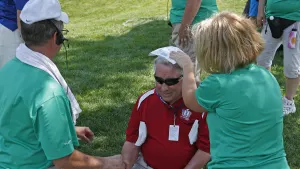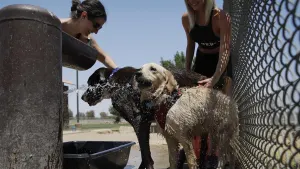More Stories
The Centers for Disease Control and Prevention says that more than 600 people in the United States are killed by extreme heat every year.
Here are some tips to help you stay healthy during the summer heat:
1. Drink plenty of fluids
Drink more fluids, regardless of how active you are. Don’t wait until you’re thirsty to drink. Stay away from very sugary or alcoholic drinks — these actually cause you to lose more body fluid. Also avoid very cold drinks, because they can cause stomach cramps. Heavy sweating removes salt and minerals from the body that need to be replaced. A sports drink can replace the salt and minerals you lose in sweat.
2. Wear appropriate clothing
Choose lightweight, light-colored, loose-fitting clothing.
3. Stay cool indoors
Stay in an air-conditioned place as much as possible. If you don't have air conditioning, call your local health department to see if there are any shelters in your area. Remember that due to the COVID-19 pandemic there might be restrictions on places used to keep cool, like local pools, beaches and shopping malls.
4. Electric fans may not prevent illness
Electric fans may provide comfort, but when the temperature is in the high 90s, they will not prevent heat-related illness. Taking a cool shower or bath or moving to an air-conditioned place is a much better way to cool off.
5. Schedule outdoor activities carefully
Try to limit your outdoor activity to when it’s coolest, like morning and evening hours. Rest often in shady areas so that your body has a chance to recover. For children, limit playtime at peak sun exposure time and familiarize yourself with the signs of heat illnesses. The hottest part of the day is typically around 3 p.m.
6. Pace yourself
Cut down on exercise during the heat. If you’re not accustomed to working or exercising in a hot environment, start slowly and pick up the pace gradually. If exertion in the heat makes your heart pound and leaves you gasping for breath, stop all activity. Get into a cool area or into the shade, and rest, especially if you become lightheaded, confused, weak, or faint. Here are 10 tips for a heart-healthy summer from the American Heart Association.
7. Wear sunscreen
Sunburn affects your body’s ability to cool down and can make you dehydrated. If you must go outdoors, protect yourself from the sun by wearing a wide-brimmed hat, sunglasses, and by putting on sunscreen of SPF 15 or higher 30 minutes prior to going out. Continue to reapply it according to the package directions.
8. Avoid hot and heavy meals
Hot and heavy meals add heat to your body. Opt for light meals like salads. Eat small meals and eat more often. Click HERE for some cool dishes.
9. Do not leave children and pets in cars
Cars can quickly heat up to dangerous temperatures, even with a window cracked open. While anyone left in a parked car is at risk, children are especially at risk of getting a heat stroke or dying. Never leave infants, children or pets in a parked car, even if the windows are cracked open. To remind yourself that a child is in the car, keep a stuffed animal in the car seat. When the child is buckled in, place the stuffed animal in the front with the driver. When leaving your car, check to be sure everyone is out of the car. Do not overlook any children who have fallen asleep in the car. Do you know what to do if you see a pet in a hot car? Here are 7 tips.
10. Keep your pets hydrated and check for hot pavement
Provide plenty of fresh water for your pets, and leave the water in a shady area. Be careful when going for walks with your dog, the pavement can get very hot and burn their paws. Humane Society and ASPCA have more tips. Here are some tips to help keep your pets cool during the dog days of summer.
11. Monitor those at high risk
Although anyone at any time can suffer from heat-related illness, some people are at greater risk than others, including, infants and young children, people 65 years of age or older, people who are overweight, people who overexert during work or exercise, people who are physically ill, especially with heart disease or high blood pressure, or who take certain medications, such as for depression, insomnia, or poor circulation.
12. Know the signs of heat-related illnesses
Symptoms of heat exhaustion:
If you experience these symptoms, move to a cooler place, stop exercising and cool down immediately by dousing yourself with cold water and rehydrating. You may need to seek medical attention.
- Headaches
- Heavy sweating
- Cold, moist skin, chills
- Dizziness or fainting
- A weak and rapid pulse
- Muscle cramps
- Fast, shallow breathing
- Nausea, vomiting or both
Symptoms of heat stroke
If you experience these symptoms, seek medical attention right away.
- Warm, dry skin with no sweating
- Strong and rapid pulse
- Confusion and/or unconsciousness
- High fever
- Throbbing headaches
- Nausea, vomiting or both
13. Avoid burns
If playground equipment is hot to the touch, it is too hot for your child's bare skin. To learn more about summer safety, visit the National Safety Council's summer safety website here.





